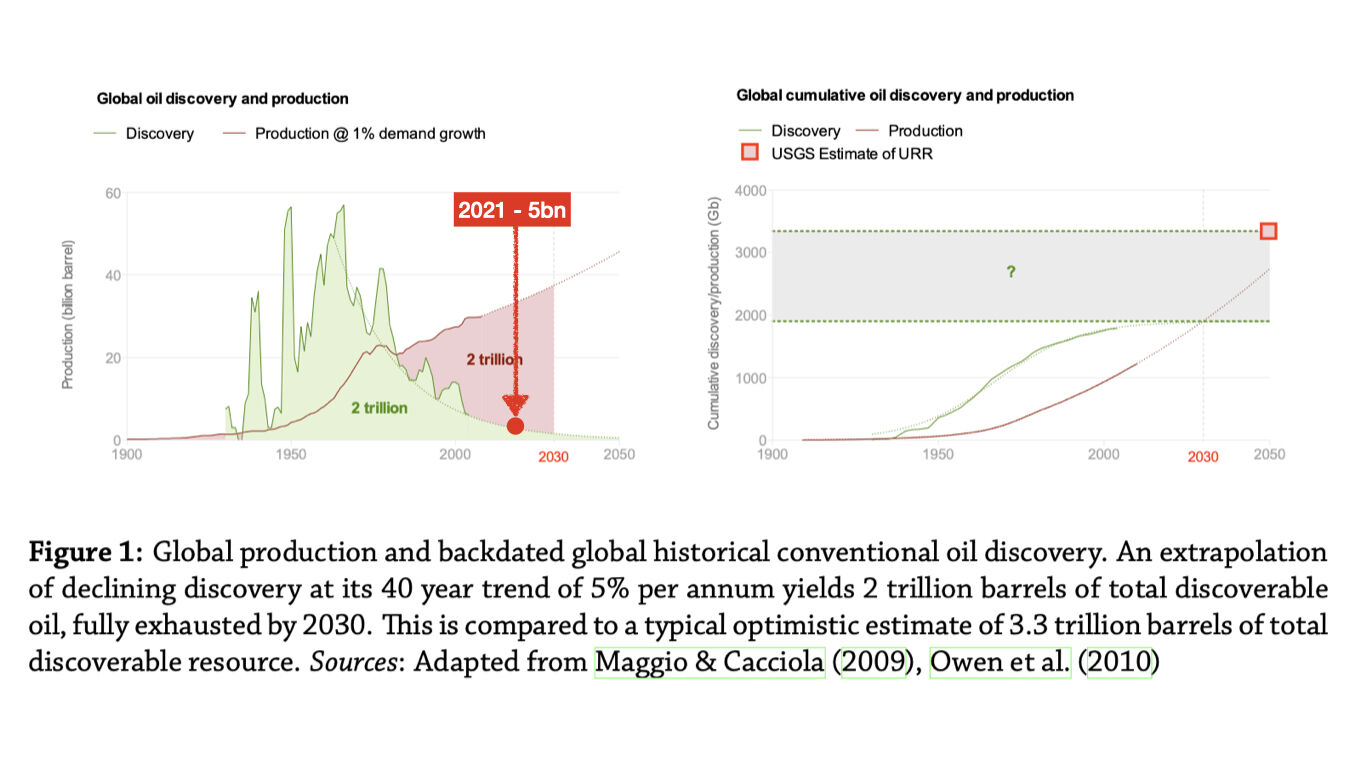Energy | All fall down
Oil Discoveries Are Collapsing
- Date
-
 Richard Lyon
Richard Lyon
In my energy economics thesis 10 years ago, I plotted backdated global oil discovery annual volumes to derive an estimate of Ultimate Recoverable Reserve. I placed it at around 2 trillion barrels, some 2/3rd of the USGS estimate (see the chart below).

Discoveries are falling
Fast forward to today, and Rystad Energy report 1 that the O&G industry discovered less than 5 billion boe in 2021 - the worst performance in 75 years. This point falls more or less exactly on the projection line I constructed 10 years ago
In my analysis, I noted that 2 trillion barrels, extracted at a rate increasing at 1% per year, is fully exhausted by 2030. Rysted notes that “Big Oil” is on track to exhaust current remaining reserves in less than 15 years. Close enough.
Three brief observations that follow on from these data that are perhaps relevant to climate catastrophism’s outlandish current demands:
-
The heavy lifting in the climate catastrophe industry narrative is done by “technology”. The peak of oil discovery in 1970 preceded every significant technology disruption of the 20th century - transistors and miniaturisation, computing, landing on the moon and orbital surveillance, material sciences, etc. They didn’t make the slightest difference to the discovery trend, which is determined by the brutal logistics equation characterising the physics of easy first/hard last systems, rather than printing money.
-
The one problem that technologies that depend on converting huge quantities of high gradient energy into “solutions” cannot address is depletion of the source of high gradient energy that solutions depend on - the problem climate catastrophe industry claims to be solving.
-
Building out contraptions requires huge quantities of oil to provide the plastics and advanced composite materials, and the energy to mine, refine, heat-form, assemble, transport, operate, maintain, and replace them. Long before that task is complete, we will have reallocated oil and gas to even more critical applications, such as maintaining the oil-derived food supplies supporting 7 billion people.
You can produce 2 trillion barrels slowly over a long time. Or quickly over a short time. The harder you produce it today, the steeper it falls off the cliff tomorrow. We’ve opted for the latter, printing trillions of dollars of irredeemable debt to accelerate oil forward. Now, the oil companies are liquidating themselves, returning cash to shareholders rather than throwing it into dry holes in the ground.
The effect is rather like the final few moments of a slow motion crash test, before the bumpers start to collapse, the windscreen explodes, and the dummy flies forward to be spattered on the steering wheel. It all seems eerily normal - so normal, in fact, that our friends in the climate catastrophe industries are urging governments to accelerate the car.
Perhaps Gretha Thunberg’s generation should have been taught some of these principles in their home schooling lessons.